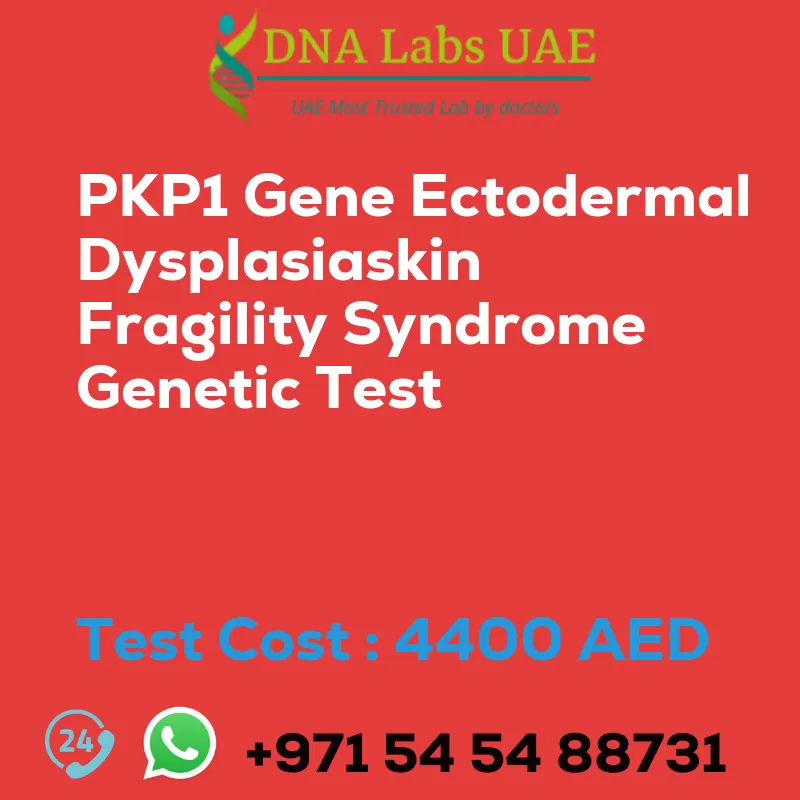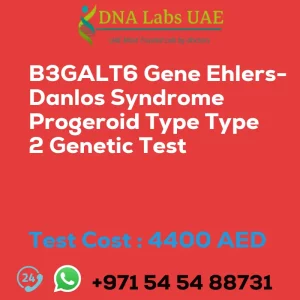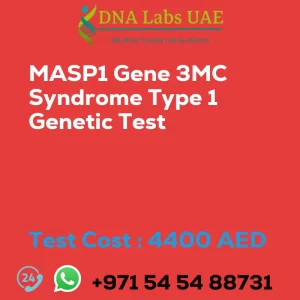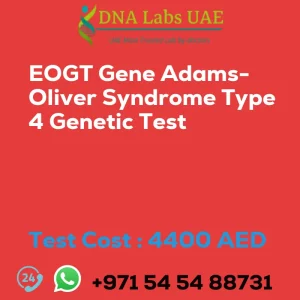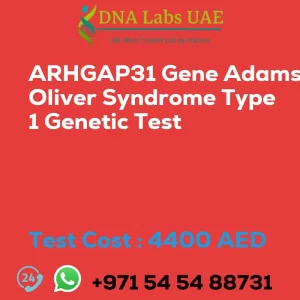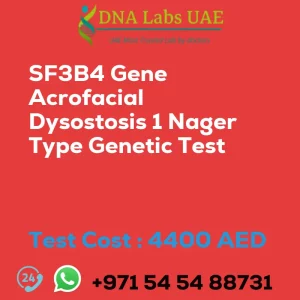PKP1 Gene Ectodermal Dysplasia/Skin Fragility Syndrome Genetic Test
At DNA Labs UAE, we offer the PKP1 Gene Ectodermal Dysplasia/Skin Fragility Syndrome Genetic Test. This test is designed to identify mutations or variations in the PKP1 gene, also known as the plakophilin 1 gene, which is associated with a rare genetic disorder called ectodermal dysplasia/skin fragility syndrome.
Test Components
- Price: 4400.0 AED
- Sample Condition: Blood or Extracted DNA or One drop Blood on FTA Card
- Report Delivery: 3 to 4 Weeks
- Method: NGS Technology
- Test Type: Osteology Dermatology Immunology Disorders
- Doctor: Dermatologist
- Test Department: Genetics
Pre Test Information
Prior to undergoing the PKP1 Gene Ectodermal Dysplasia/Skin Fragility Syndrome Genetic Test, it is important to provide the clinical history of the patient. Additionally, a genetic counseling session may be conducted to draw a pedigree chart of family members affected by PKP1 Gene Ectodermal Dysplasia/Skin Fragility Syndrome. This will help in understanding the inheritance pattern and potential risks.
Test Details
Ectodermal dysplasia/skin fragility syndrome is a rare genetic disorder that affects the development of ectodermal tissues, including the skin, hair, nails, teeth, and sweat glands. The PKP1 gene plays a crucial role in this syndrome. The NGS (Next-Generation Sequencing) genetic testing method is used to analyze the PKP1 gene for any pathogenic variants or mutations.
NGS testing is a more efficient and cost-effective approach compared to traditional sequencing methods. It allows for the simultaneous analysis of multiple genes, providing valuable information for genetic counseling, prognosis, and potential treatment options. However, it is essential that NGS genetic testing is performed by qualified healthcare professionals, such as geneticists or genetic counselors, who can interpret the results accurately and provide appropriate guidance and support to patients and their families.
By undergoing the PKP1 Gene Ectodermal Dysplasia/Skin Fragility Syndrome Genetic Test, individuals can confirm a diagnosis of the syndrome and gain a better understanding of their condition. This knowledge can help in making informed decisions regarding treatment and managing the disorder effectively.
| Test Name | PKP1 Gene Ectodermal dysplasiaskin fragility syndrome Genetic Test |
|---|---|
| Components | |
| Price | 4400.0 AED |
| Sample Condition | Blood or Extracted DNA or One drop Blood on FTA Card |
| Report Delivery | 3 to 4 Weeks |
| Method | NGS Technology |
| Test type | Osteology Dermatology Immunology Disorders |
| Doctor | Dermatologist |
| Test Department: | Genetics |
| Pre Test Information | Clinical History of Patient who is going for PKP1 Gene Ectodermal dysplasia/skin fragility syndrome NGS Genetic DNA Test. A Genetic Counselling session to draw a pedigree chart of family members affected with PKP1 Gene Ectodermal dysplasia/skin fragility syndrome NGS Genetic DNA Test gene PKP1 |
| Test Details |
PKP1 gene, also known as plakophilin 1 gene, is associated with a rare genetic disorder called ectodermal dysplasia/skin fragility syndrome. This syndrome is characterized by abnormalities in the development of ectodermal tissues, which include the skin, hair, nails, teeth, and sweat glands. NGS (Next-Generation Sequencing) genetic testing is a diagnostic tool used to identify mutations or variations in the DNA sequence of specific genes. In the case of ectodermal dysplasia/skin fragility syndrome, NGS genetic testing can be used to analyze the PKP1 gene for any pathogenic variants or mutations. By identifying these genetic changes, NGS testing can help confirm a diagnosis of ectodermal dysplasia/skin fragility syndrome and provide valuable information for genetic counseling, prognosis, and potential treatment options. This testing method is more efficient and cost-effective compared to traditional sequencing methods, as it can analyze multiple genes simultaneously. It is important to note that NGS genetic testing should be performed by qualified healthcare professionals, such as geneticists or genetic counselors, who can interpret the results and provide appropriate guidance and support to patients and their families. |

